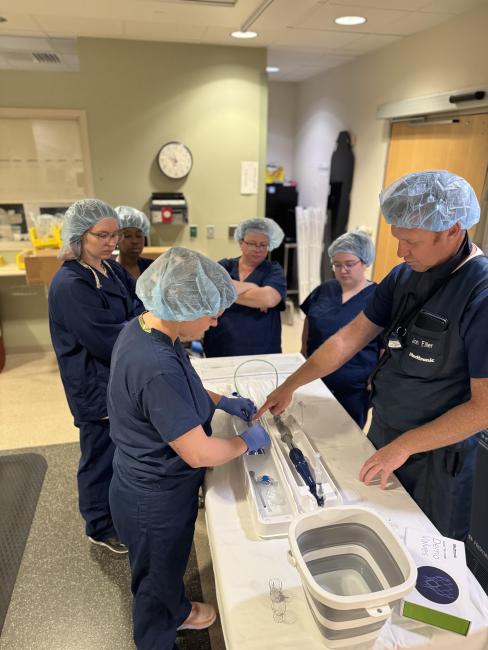Feb. 7, 2025
The terminology around procedures related to the heart can get pretty complex. That’s why Rachel Morairty, program director of Cardiovascular Technology at Grand Rapids Community College, keeps it simple.
“We are plumbers for the heart,” Morairty said. “We unclog vessels.”
That’s an oversimplification, but the point is clear. It's a simple way to explain a complex, fast-paced specialty that is growing by leaps and bounds. People who earn a degree in cardiovascular technology use their specialized knowledge to help interventional cardiologists address problems such as clogged arteries, valve failure, arrhythmia and more.
The growth in this field stems from several things.
“Any time you can perform procedures that are less invasive, you’re helping the patient. It used to be that if someone had a heart issue, surgeons had to open up the ribs and get hands on. Now we do all kinds of procedures using small tubes,” Morairty said. “With less trauma, we see decreased infection rates, decreased use of opioid pain medications, faster recovery and much less discomfort. But that being said, it seems that ‘less invasive’ always means ‘more technology dependent.’ That's why this field needs skilled people.”
GRCC’s cardiovascular technology program is the first of its kind at a Michigan community college. The program is 16 months long. Students combine distance learning courses with a rigorous clinical commitment. GRCC partners with some of the best heart centers in Michigan for its clinical locations.
“We work with Meijer Heart Center, Trinity Health, University of Michigan, Ascension Borgess, Bronson and Henry Ford, just to name a few,” Morairty said. “We can only place one student at each site, so right now our maximum cohort size is 15 students.”
This field is perfect for someone who wants constant learning in a fast-paced environment.
“There’s something new every day,” Morarity said. “For example, one of the big advancements coming to the field is transcatheter aortic valve replacement (TAVR). TAVR is a way to fix a failing valve without open heart surgery. We actually insert an artificial replacement valve in the heart by going through a tube inserted into the leg.”
Given that all this science is being applied to the heart, it takes a special person to work in this field.
“It’s a high risk environment,” Morairty said. “You need to be on your toes all the time. You have to think and react quickly using both your science and your technology skills. But that being said, the growth rate is enormous. Once you pass your board exam, the job market is yours.”
Learn more about the Cardiovascular Technology program at GRCC.
This story was reported by Julie Hordyk.
